|
What adjectives come to mind when you think of Gary Cooper? Honest? Dependable? Honourable, perhaps? Of course, much of this is down to his performance as Marshal Will Kane in Fred Zinnemann's Western classic High Noon. It's a role that effectively defined his career, as a man who would do what a man had to do, whatever the odds and for all the right reasons. This was a man you could trust with your life and your deepest secrets. It's the sort of role that somehow fell naturally to Cooper, who specialised in looking unsure of himself on screen, and thus when he came through the sense that he really had battled against the odds was considerably greater than it would be for the likes of John Wayne or even the wily James Stewart. With Cooper there was often a feeling that he had been pushed into the job against his will and had decided to make the best of it. His apprehension showed, but his grit seemed real.
So it comes as a bit of a surprise to watch Cooper in the opening minutes of the 1958 Man of the West lying about his name to a man of the law. We know he's lying because when he gets asked about it again a few minutes later by someone else he gives a different answer. His real name is Link Jones, but we won't have this confirmed until almost a third of the way into the film. The lawman approaches him on a station platform when he spots him talking to the second enquirer, Sam Beasley (Arthur O'Connell), a cheerful chatterbox with a likely scam up his sleeve. It's Beasley that initially catches the lawman's eye, but on approaching Link he seems to think the two have met somewhere before. Link is adamant that they haven't. Once installed on the train, Link sees the sheriff scrutinising him a second time and shifts his position to better shield his face. He's clearly hiding something, the question is what? And this is Gary Cooper. If he's lying then there has to be a damned good reason. Doesn't there?
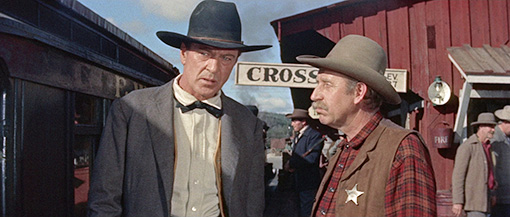
It helps that we warm so easily to Link, thanks in part to some amusing bits of character business. It quickly becomes clear that not only has Link never travelled by train, but also that he's never even seen one before. He jumps back in alarm when the engine spits out steam and describes the locomotive to Beasley as "the ugliest thing I ever saw in my life." Train enthusiasts might want to steel themselves up for this moment. When he locates his seat he has considerable trouble wedging his lanky frame into the ludicrously small space apportioned, a sequence that delights through the comedy of recognition, at least for us cursed with a taller frame. As he juggles his body about trying to lever his legs into a position that's even remotely comfortable, bouncing the occupant of the seat in front all over the shop in the process, I was reminded of the time I had to cram myself into a space that would likely tax undersized children on my one and only experience of flying with Ryanair.
On the train Link is pestered again by Sam Beasley, who demonstrates an admirable degree of gender equality by then bothering attractive showgirl Billie Ellis (Julie London) instead. When the train stops to take on wood and the able bodied menfolk get up to lend a hand, Sam introduces Link to Billie. Link has told Sam that he is heading to Forth Worth in search of a schoolteacher, and wouldn't you know it, before becoming a dancing girl Billie trained in this very profession. What are the odds?
It's shortly after this that the train is attacked in a failed robbery attempt, and the engine pulls away without Link, who was hit on the head by one of the gang. In the film's most unlikely coincidence, Sam and Billie have also been left behind. With a hundred miles to the nearest town and the next train not due for another week, they set off in search of shelter and find it in the shape of a small farm that Link appears to know rather well. Unfortunately for them all, it's far from deserted.
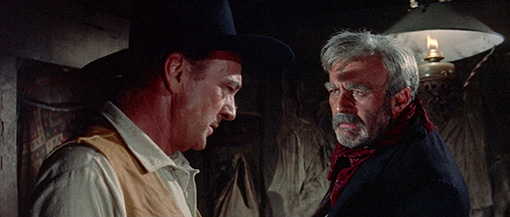
It's here that the film darkens considerably in tone, as our three apparent innocents descend into a sort of metaphoric hell. The farmhouse is occupied by the gang that tried to rob the train, and they don't swallow Link's story about stumbling across the place by chance. His cover's completely blown when the craggy, unhinged and patriarchal Dock Tobin (Lee J. Cobb) appears from the back room and instantly recognises him. Then again, that's hardly surprising. Dock is actually Link's uncle and effectively raised him, and together they robbed and killed until one day Link wanted no more of this life, and without a word of goodbye he got up and left. Although distraught at the time, Dock now appears delighted to see his former protégé. Link assures him that he's returned to the fold, but the gang aren't buying it, especially the twitchy and salacious Coaley (Jack Lord), who thinks they should kill Link and his companions (well the male one, at least) and be done with it.
From this point on the film plays less like a traditional western than a supremely discomforting psychological drama with just the faintest whisper of a torture porn horror. Whatever his past relationship with Dock may have been, here Link is essentially powerless, unarmed and lacking the guile and physical strength to either outwit or outmanoeuvre the men who at any moment might become his executioners. It's this constant threat of violence, coupled with the unpredictability of characters on the edge of sanity and lighting that surrounds them with foreboding shadow, that creates the air of unbroken tension that runs through the entire final two thirds of the film. This peaks in a scene that few will be able to sit through even today without squirming, as Billie is forced to strip for the gang's entertainment while a wide-eyed Coaley holds a knife to Link's throat, tightly enough to draw blood and sink into his skin. They're set to suffer worse before the story concludes.
Little here plays out in the generically expected manner. That Billie will fall for Link is almost a given, particularly after he tells Dock that she is his girl in an effort to protect her from the old man's advances, and even shares a bed with her in the barn to follow through on this claim when a drunken Dock stumbles out to pay them a visit. But when she comes clean about her feelings he reveals that he's happily married, and with a conviction that confirms that this time around the girl is not going to get the guy she's been searching for all of her life. The violence, when it comes, also plays with convention. When a sanctioned fist fight presents Link with an opportunity to unleash his anger on Coaley, the scrappy and increasingly desperate nature of the brawl, one in which vocal responses are reduced to animalistic screeches, effectively numbs the scene's potential for cathartic release.
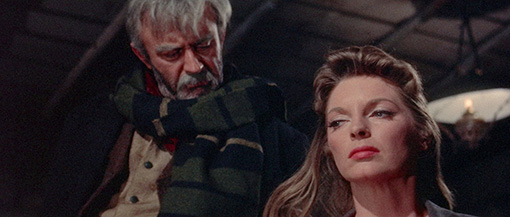
Cooper is on particularly fine form here, his well practiced air of apprehension accentuating Link's vulnerability, his anger ferocious when finally unleashed. A common complaint was that he was too old for the role as Dock's nephew (Lee J. Cobb was ten years younger than Coop), but for me this was never an issue, and as Douglas Pye states in the extras on this disc, it suggests that Link walked out on Dock not as a confused teenager but a fully aware adult, which is actually more interesting. Cobb has also copped a fair bit of flack for a performance that some feel is playing to the gallery, but given that Dock is losing his marbles and that unpredictable fury is one of his weapons of control, his sudden verbal explosions feel absolutely right for his character. Julie London does a gut-wrenching job of communicating Billie's fear, humiliation and suffering, and if you only know Jack Lord from his portrayal of nice guy cop Steve McGarrett in Hawaii Five-O, you might be surprised by how scary he is here as the semi-psychotic Coaley.
Man of the West was the penultimate western in the career of director Anthony Mann, a major figure in 50s genre cinema who was not widely recognised as such until close to the end of his career (ain't that so often the way?). He's primarily remembered for his work with James Stewart, noir-tinged revisionist films whose heroes were usually flawed and weighed down by the baggage of their own troubled past. All had a downbeat edge, but none were as dark and threatening as Man of the West, and although not as widely seen or discussed as Winchester '73 or The Man From Laramie, for my money it's every bit their equal. And as a new decade dawned, it also unknowingly signposted the direction the genre was later to take, when films like Sam Peckinpah's The Wild Bunch and Ralph Nelson's Soldier Blue effectively turned the Western on its head.
Ah, it warms my heart to see a 50s Western looking as good as Man of the West does here. A lovely 2.35:1 transfer that's at its best in the wonderfully rendered sunlit exteriors, though it still copes well with the gloomy night-time farmhouse interiors once the metaphorical darkness descends on the story. Colours are sometimes more muted here and the shadows frequently swallow up picture detail, but this was clearly intentional. The black levels are solid for the most part, but do occasionally soften a little when the light levels really drop, and there is some detectable flickering in places, but the detail is excellent throughout and the image is spotless and sits rock-solid in frame. A most impressive job.
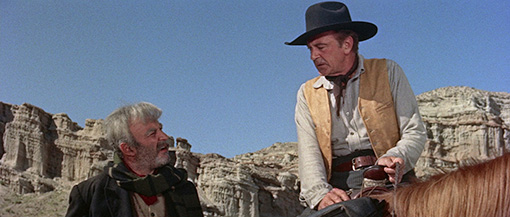
The Linear PCM mono 2.0 soundtrack has the expected dynamic range restrictions, but is otherwise clear and free of damage. Leigh Harline's music score fares particularly well here.
Commentary
Critics Glenn Kenny and Farran Smith Nadine repeat their role from the Masters of Cinema Wild River disc, analysing the film and its characters and providing plenty of information on its production and the key players on both sides of the camera. They highlight the ways in which the film deviates from the Western norm, and quote from a glowing contemporary review by a certain Jean-Luc Godard, who regarded it as one of the finest films of the year. They do intermittently point out the obvious and are not the most vocally dynamic pair on the block, but there's still plenty of worthwhile stuff here.
Douglas Pye on Man of the West (17:11)
Writer and film professor Douglas Pye delivers a gently spoken but compelling analysis of the development of the American Western, Anthony Mann's career and Man of the West in particular. The ways in which the film differs from its source novel (The Border Jumpers by Will C. Brown) is covered in some detail, and I was particularly struck by his suggestion that the Tobin gang are presented almost as ghosts emerging from the darkness of Link's past. Oh absolutely.
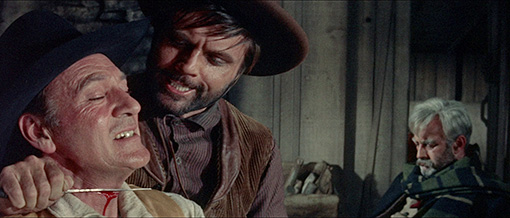
Theatrical Trailer (3:01)
"Here is Your Biggest Man!" shouts the opening text of a trailer that's peppered with spoilers and the odd misleading claim about its central character, while the narrator assures us that "It's a rare extraordinary western crackling with the most electrifying scenes you've ever thrilled to!" All right then.
Booklet
Another handsomely produced and illustrated Masters of Cinema booklet, which kicks off with a welcome reproduction of the Jean-Luc Godard review quoted by Glenn Kenny in the audio commentary, which is followed by a substantial and fascinating analytical essay on Anthony Mann and Man of the West by respected critic Robin Wood. Credits for the film, stills and notes on viewing are also included.
Many years ago I was working in London when the National Film Theatre (now BFI Southbank) ran a season of Anthony Mann films, many of which I was able to attend. It was my first exposure to much of the director's work and as a fan of 50s and 60s Westerns I was an instant convert. For some reason I missed out on Man of the West, which makes it one of the few Mann westerns I've not seen on the big screen. It matters not, as even on a somewhat smaller screen it proved gripping, tense and unsettling cinema, an adult Western in all that is good about that suggestive term. A fine transfer and some solid extra features make this a must-have for genre devotes and film fans alike.
|